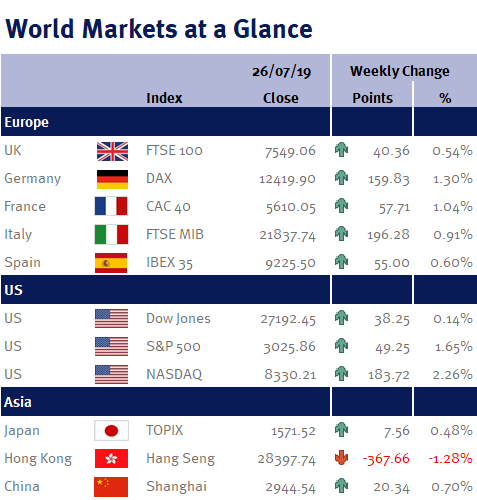It would be wrong to conclude that it was a quiet week given global equity markets were little changed, as beneath the surface there were plenty of interesting stories bubbling away.
Week ending 19th July 2019.
22nd July 2019

There were mixed signals on Chinese growth. Highlighting how the US/China trade spat is biting, China’s Q2 GDP growth slowed to 6.2% – the weakest pace since the reported data began in 1992. However, data for the month of June (factory output, retail sales and fixed asset investment) all beat estimates – suggesting that the government stimulus is starting to cushion the impact of the trade friction.
While China’s economic data supported global equity markets at the start of the week, Donald Trump played the role of ‘spoiler’ by saying that if the trade spat remains unresolved, he could impose more tariffs on China.
However, Donald Trump’s threat of more tariffs on China only increases the chances that the Fed will cut US interest rates.
Interestingly, the Fed’s Beige Book showed that while the US economy expanded at a modest pace the report noted job gains were slowing, inflation was slightly weaker and that there were “widespread concerns about the possible negative impact of trade-related uncertainty”.
Additionally, Jay Powell, the Fed chairman, this week said that the Fed is “carefully monitoring” downside risks to US growth and “will act as appropriate to sustain the [economic] expansion”, while the Chicago Fed President, Charles Evans, said interest rates need to be cut in order to lift inflation.
This all suggests that it is now a foregone conclusion that the Fed will cut US interest rates during their next meeting on Wednesday 31 July 2019. Although the likeliest outcome is a 0.25% interest rate cut, we believe that there is still a good chance of a larger 0.5% interest rate reduction as it is better to be proactive and cut early and cut aggressively to cushion the trade uncertainty, rather than be reactive and wait for the economy to actually start turning down before meaningfully reducing interest rates.
While it may be difficult to believe, there is more to global equity markets than US interest rates! And this week, the US earnings season got underway.
Results were mixed; eBay, IBM (International Business Machines), ASML (semiconductor supplier) and Philip Morris (tobacco) all saw their shares end the week higher after beating expectations. However, Netflix shares fell after it announced that it had lost customers in the US and missed its global sign-up target, highlighting that consumers are highly sensitive to price increases following the recent inflation-busting increase in subscription prices, while railroad freight operator, CSX, also disappointed thanks to the US/China trade uncertainty.
This coming week we have US Q2 GDP, Japanese CPI and an ECB monetary policy meeting. Additionally, on Tuesday (23 July 2019) it is all change/no change as we finally find out who our next Prime Minister is.
Investment Management Team
The latest market updates are brought to you by Investment Managers & Analysts at Wealth at Work Limited which is a member of the Wealth at Work group of companies.
Links to websites external to those of Wealth at Work Limited (also referred to here as 'we', 'us', 'our' 'ours') will usually contain some content that is not written by us and over which we have no authority and which we do not endorse. Any hyperlinks or references to third party websites are provided for your convenience only. Therefore please be aware that we do not accept responsibility for the content of any third party site(s) except content that is specifically attributed to us or our employees and where we are the authors of such content. Further, we accept no responsibility for any malicious codes (or their consequences) of external sites. Nor do we endorse any organisation or publication to which we link and make no representations about them.

